
Open data is important to humanitarian aid organizations as it can help improve decision-making, increase transparency, facilitate collaboration, improve response times, better allocate resources, and evaluate the impact of their work.
Six Open Data Benefits to Aid Organizations
- Improved decision-making: Open data can provide humanitarian organizations with a more comprehensive and accurate understanding of the situation on the ground, which can help inform their decision-making processes.
- Increased transparency: By making data openly available, humanitarian organizations can demonstrate their commitment to transparency and accountability, which can help build trust with stakeholders.
- Better collaboration: Open data can help facilitate collaboration between humanitarian organizations, governments, and other stakeholders, as they can all access the same information and work together more effectively.
- Improved response times: Open data can help humanitarian organizations respond more quickly and effectively to emergencies by providing real-time information about the situation on the ground.
- Better allocation of resources: With access to open data, humanitarian organizations can make more informed decisions about how to allocate resources, ensuring that they reach those who need them most.
- Better evaluation of impact: Open data can also help humanitarian organizations evaluate the impact of their work, as they can compare data from before and after their interventions to see the changes that have occurred.
Introducing the Updated Principles for Digital Development
Since their inception in 2014, the Principles for Digital Development have been endorsed by over 300 organizations globally – including donors, multilateral...
14 Barriers to Using Open Data for Better Development Decisions
Open data became a global phenomenon slightly over a decade ago and over the years has been adopted around the world by different stakeholders on the African...
Who Owns the Data in Global Public Health Programming?
A couple of years ago I attended the Global Digital Health Forum, where a speaker by the name of Jeff Street said something that has stuck with me ever since: “Whoever...
A Six-Step Playbook for Doing Data Science & AI for Good
The Data Science and AI for Good landscape has exploded, with more organizations doing data for good work than ever before. At the same time, there’s an abundance...
Apply Now: $250,000 for Open Source COVID-19 Digital Health Solutions
As the COVID-19 Digital Response continues to create global goods with scalable digital solutions using open standards and approaches, there is a need to focus...
Apply Now: $100,000 for PEPFAR PLHIV Client Segmentation Analysis
The global health community traditionally relies on qualitative and quantitative formative research to address key questions related to services that support people...
Please Use Accurate Poverty Maps in Humanitarian Relief Programs
Many critical decisions require accurate, quantitative data on the local distribution of wealth and poverty.
Governments and non-profit organizations rely on such...
3 Barriers to Data Sharing for African Artificial Intelligence Solutions
Please RSVP Now to learn more about artificial intelligence solutions at the Global Digital Development Forum on May 5. Our amazing agenda features an entire conference...
Please Nominate Your Digital Public Good Software and Data Today!
The Digital Public Goods Alliance is a network of partners from different sectors who contribute to the identification, support, scale-up, and proper use of digital...
Apply Now: $58 Million for African Data Science & Health Research Grants
In the next decade, rapid advances in data science are expected to transform biomedical and behavioral research and lead to improved health for individuals and...











